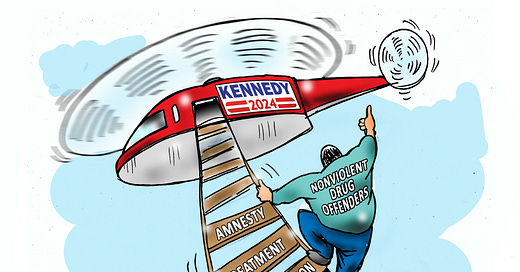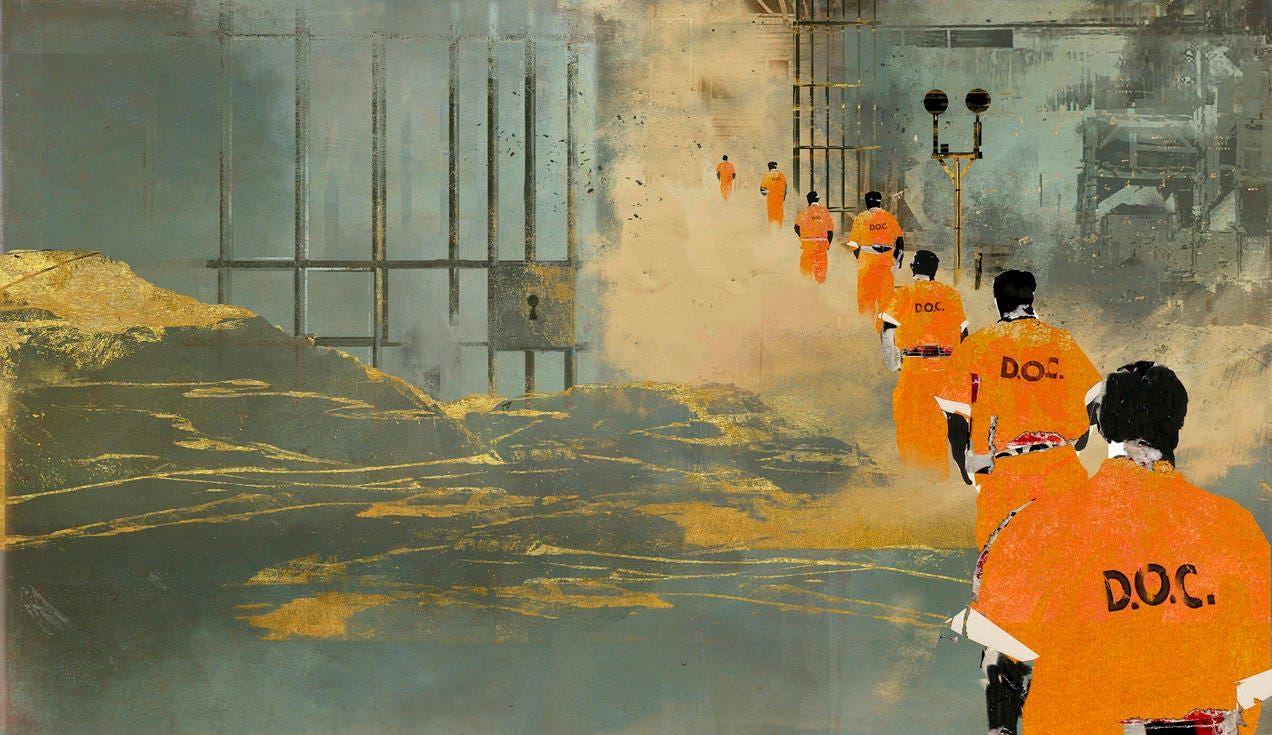On Day One, Kennedy Will End the Failed ‘War on Drugs’
By Jeremy Kuzmarov, Special to The Kennedy Beacon
Voters in the upcoming Democratic Party primaries should be excited that on ‘day one’ Kennedy would end the War on Drugs. That disastrous policy has transformed the U.S. into one of the world’s leading prison states and resulted in the advent of what Michelle Alexander termed a “new Jim Crow,” with unnecessary and destructive over-policing in Black neighborhoods.
The War on Drugs has had long staying power despite its failure to curb drug abuse, due, possibly, to a number of factors: Banks make billions laundering drug money; police and law enforcement agencies get huge funding to expand their size and weaponry to fight the War on Drugs; arms manufacturers that fund political candidates make a brisk business; and the prison industry sustains local economies and finances politicians nationwide.
Although President Joe Biden has directed more federal resources to harm reduction services designed to keep drug users safe and pardoned thousands of people convicted on federal marijuana possession charges, he has bolstered funding for the Drug Enforcement Adminstration (DEA), the main federal agency responsible for waging the War on Drugs, by $300 million. The Biden administration has also made a $300 million increase for customs and border protection, which is also heavily invested in drug prohibition.
If Biden were truly interested in mitigating the harm done by drugs in the U.S., he would decriminalize them—as Kennedy proposes—which has been shown to work successfully in the Netherlands, Portugal, Switzerland and elsewhere. As when alcohol prohibition laws were repealed, decriminalization—meaning people cannot go to jail for using drugs though could still have those drugs seized—would obviate the opportunities for violent criminal drug cartels.
But instead, the “war” pushes drug-running profits higher and higher, making the interests associated with the military-police-industrial complex happier and happier, as the prospects for ending drug crimes grow dimmer and dimmer.
Kennedy’s mission to end the War on Drugs is rooted, in part, in his own experience as a former addict, who underwent years of treatment, and can empathize with others struggling with addiction.
Criticizing candidates at the first GOP debate for recycling “Reagan era clichés…about being ‘tough’ on drugs,” Kennedy has said that after legalizing marijuana at the federal level, he would tax the consequent income, which would go towards creating healing centers located in rural areas where addicts would have the opportunity to learn organic farming, as a therapeutic tool, and to grow and eat organic food and heal spiritually, physically, and emotionally.
As Kennedy mentioned on Fox News last July, one quarter of prisoners in the U.S. have been incarcerated for non-violent drug crimes, and he promised to grant amnesty to nonviolent drug offenders and make rehabilitation accessible to everyone. He said he would reverse the trend that has led to drug treatment devolving into a predatory industry that only provides treatment to 6.5 percent of drug addicts.
Additional revenues for the healing centers would derive from redirecting billion of dollars now sent for weapons to Ukraine, which Kennedy calls, “a money-laundering scheme,” taking wealth out of the pockets of tax-payers and putting it into the coffers of Boeing, Raytheon, and Lockheed-Martin, which, he notes, are owned by the investors of “BlackRock, State Street, and Vanguard.”
As Kennedy recently observed, “We need to be taking some of that money we're sending to Ukraine and start spending it on the crisis we're having right here at home.” Kennedy further noted that we’re not only in an “epidemic of addiction, alcoholism, but also just loneliness, despair, disassociation, alienation” while those in power are “addicted to war.”
With his drug policies, Kennedy follows his father, Robert F. Kennedy Sr., who, as Attorney General in the 1960s and Senator from New York, supported drug treatment programs and challenged marijuana criminalization, stating that cigarettes “kill far more people every year than marijuana.”
In 1966, Senator Kennedy convened a special Senate subcommittee and issued a report, in which he defended Lysergic Acid Diathylamide (LSD) against the rampant hysterical belief that LSD would permanently damage the mental health of all users, which had not been suggested by the scientific literature. Though warning about the LSD’s dangers when used irresponsibly by youth, Kennedy, Sr. said that “experiments indicate that LSD may be useful in treating alcoholics, one of the largest groups of the handicapped, and has been helpful in some cases in adjunct in psychotherapy.”
In a Town Hall event, Robert F. Kennedy Jr. revealed that he shares the same open-minded view as his father, having read some of the scientific literature showing how people suffering from Post-Traumatic Stress Disorder (PTSD) and other mental health conditions could be helped by psychedelic drugs, if taken in the right environment under the care of a professional.
Kennedy meanwhile promotes alternatives to Biden’s supply side approach that has helped fuel illegal immigration by contributing to “desperate conditions south of the border” and led the U.S. to “fund dictators, juntas, paramilitaries and death squads.”
Biden’s Failed War on Drugs
Joe Biden’s support for the War on Drugs goes back to his first campaign for the U.S. Senate in 1972, when he saw that he could please crowds with tough talk.
As Branko Marcetic reports, in Yesterday’s Man: The Case Against Joe Biden, at one rally, Biden proclaimed that, “when we find the pusher, we must deal more severely with him than with any other element of the criminal society. There should be no mercy.”
In the 1980s, Biden embraced the War on Drugs with as much zeal as drug war guru Ronald Reagan. As chairman of the Senate Judiciary Committee, he helped pass a bill establishing mandatory minimum sentencing for drug offenses. The racist character of the new bills was epitomized by the strict sentencing provisions for crack cocaine, a drug of the inner-city, compared with powder cocaine, which Time called “the champagne drug of the rich.”
The double standards of the War on Drugs was further apparent in that Biden’s son Hunter repeatedly violated the laws his dad had helped pass, and, according to evidence uncovered in his laptop, should have gone to prison for decades under those laws.
One of Biden’s campaign ads from the 1980s characteristically called drug dealers, “potential killers,” who should be tracked down “like we track down killers.” The drug trade in his view was as much a threat to the international security of the U.S. as “anything the Soviets are doing,” and should be treated as a “national defense problem,” requiring military solutions.
Kennedy more presciently sees the drug trade as a public health problem requiring a public health solution whose root causes need to be addressed.
The failure of a militarized approach can be seen in Colombia, which has remained a world leader in coca production despite a billion dollar anti-drug program championed by Biden since the 1990s, Plan Colombia, which resulted in funding for death squads valued for suppressing left-wing guerrillas considered to be narco-terrorists.
Senator Paul Wellstone (D-MN) promoted an alternative to Plan Colombia in 1999 that would have switched $225 million from military aid to drug treatment programs at home. He argued that “we’ve been down this road forever, forever,” and that “more soldiers and more guns have not and will not defeat the source of illegal narcotics.” Unfortunately, Biden rose immediately to President Bill Clinton’s defense in the Senate, stating that Congress would “wreak a whirlwind” if Plan Colombia “failed to strike back at the drug traffickers,” and that Colombia’s President Andrés Pastrana (who was actually very corrupt) was the “real deal.”
The worst aspect of Plan Colombia was an aerial defoliation program using herbicides banned in the U.S. that poisoned the groundwater of rural communities, caused innumerable health problems, and resulted in the displacement of seven million Colombians. These human costs were “never part of the policy calculus for Joe Biden,” according to John Lindsay-Poland, author of a book on Plan Colombia.
They are part of the policy calculus of RFK Jr., however. He is a more sensitive man than our current president. Kennedy cares about people around the world and is committed to ending the failed War on Drugs paradigm while ushering in a new drug policy that will change society for the better.







As a former law enforcement officer with many assignments in narcotics enforcement I wholeheartedly agree with Mr. Kennedy’s proposals...as long as his program is rolled out with helping the weakest and most needy in mind...the street drug addict
OxyContin, the highly addictive painkiller opioid, is still available in the United States with a prescription. Purdue Pharma. How is it possible?
Dopesick with Michel Keaton playing the doctor.
Dopesick | Official Trailer https://youtu.be/x3Z4NFUPbZ0
Beyond the Script of Hulu's 'Dopesick' and America's Real-Life Opioid Crisis 41:04 min https://youtu.be/x4KDmENOkYM